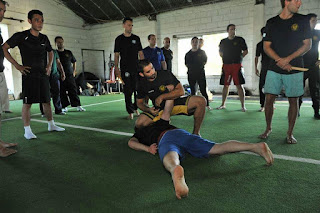Seminar instructor versus coach / mentor. Two roles I know very well and find myself juggling between them on a regular basis. On the surface these roles may seem to be the same but to truly understand them we need to look at the essence of each role.I recently came across a slogan of a teacher who calls himself a "coach on the road" (in a slightly different version, but because of my respect, I exchanged one of the words slogan).This person has not led a group of students in years overseeing their growth but rather working as an instructor in seminars.
To be a coach or mentor you have to be present in the students life where you need to have a deep understanding of their physical and emotional needs. You also have to make sure to conserve the group's energy even during your own personal trials and tribulations. We should also ensure that the group of students is able to feed and lift itself from the inside during hardships. The journey of the coach is accompany their students through the years where they will experience physical, mental as well as personal changes. As a coach we need to accept and understand when a student is busy and that they may not always be as focused, however a bridge should always be available with a open door making them feel welcome. Due to the coaches relationship with each student he will set a central goals and build sub-goals which will advance the team at the right pace rather than frustrating and stunting their progression.
The above is not reflected through my work as an instructor in seminars.During seminars you need to maintain a high work rate, you must understand that your job is to present a perception through work and hopefully this will be continued through quality training. You must maintain high energy, be very alert that you stop and help individual students but on the other hand do not let that disturb the rest of the seminar .... You need to understand that you are in front of people that only came to learn, experience and examine your professionalism.
In seminars you performing, you presenting your world and your professionalism as an expert instructor, you are not there as a coach / mentor, you are probably not their Sensei. Even if I've met those students over the years, know their personal lives, been in their homes, I'm not their Sensei, I'm not their coach. I can serve as a figure of inspiration, I can outline within my organization the basics of how and what is expected behaviour of a coach and a team leader, but you must not think that both roles are the same they don't mix.
OSU.






